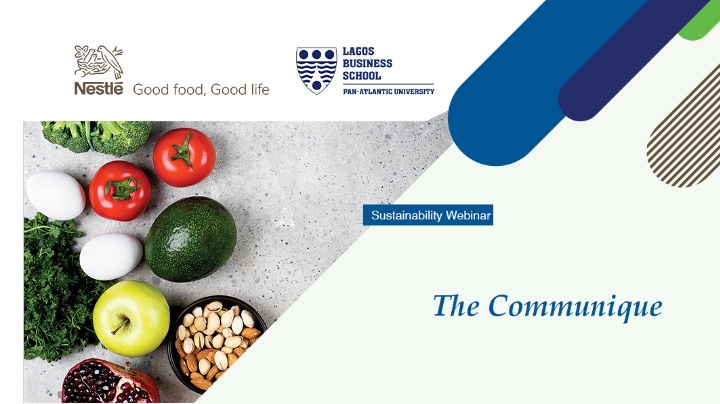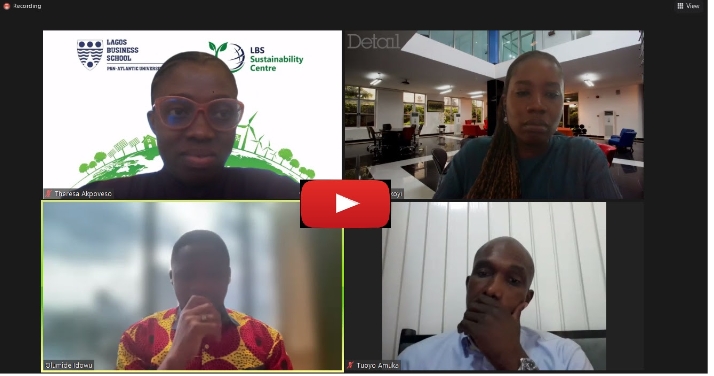
Nestle Nigeria PLC in partnership with the Lagos Business School Sustainability Centre (LBSSC) have educated the public on the knowledge needed to influence the public’s everyday health choices that could prompt adjustments leading to sustainable food and nutrition outcomes.
These were part of discussion held recently during its Webinar on “Climate Change Implications for Food and Nutrition Outcomes: The Role of the Media.”
In a communique released on the discussion, part of it is recapped below.
Increasing Media and Public Interest

The conversation harped on the role of media professionals in putting out relatable word and content that enlightens the public on the effects of climate change which is disrupting delicate food systems, and food value chains, thereby jeopardising the availability of food, health and well being of people and livelihoods across the continent and the globe at large.
As such, media professionals must be interested in climate change, because it is changing every facet of our lives; how we live, work, and play, redefining our entire life trajectories. The media must create stories that are accurate and appealing to prompt required action and inspire change.
In doing so, the media must convey information that is accessible, stimulatable, simplified and resonating to catch the attention of amplifiers and investors who are interested in climate change solutions.
Enabling the Media
Partnerships and collaborations between the government, private sector, nonprofits and the media are important in giving the media a shot in the arm to convey stories, news and content around the effects of climate change on food and nutrition outcomes in an unbiased manner.

Broader partnerships with NGOs and Development Institutions who have done a good job in pushing the climate change narrative should be encouraged and pursued. We need to do more with respect to partnerships in creating a bridge between the media and the private sector in key areas such as energy transitions to promote awareness and actionable steps for speedy progress.
A case in point is airlines and hotels that are increasingly pursuing sustainability goals and energy transitions, thus, making media professionals become more interested in creating stories around climate change in ways that are creative enough to grab the attention of stakeholders and the public at large.
Localising the Discourse

We need to catch the attention of the amplifiers and these are investors who are interested in climate change solutions. Many of whom go to great lengths in funding these climate solutions for the benefit of society, thereby encouraging the need to write collaborative stories and making it possible for investigative journalism to be funded.
Being able to show a correlation in the outcomes of climate change and how it affects the local communities will help to bring the message home and will go a long way in helping people adjust to how they live, what they eat and the deliberate efforts they make in infusing sustainability in their everyday choices.
However, there has to be conscious campaigns to help spur this. In Nigeria, many young kids now understand weather is currently more adverse due to increased awareness based on localised content they can relate with and these are the little steps we need to take.
The media should think in terms of making transition stories, and providing recommendations and solutions in their stories. These stories should also convey outcomes based on goals and actions taken. Stories should be told with nuances or should be very nuanced.

They should be creative, intentional, factual, engaging, and infused with a call to action. Most importantly, stories written from a solutions journalism angle in the form of podcasts, short videos, and others that focus on local content in Africa should be prioritised.
The media needs to tell stories from a local angle so it’s easy to localise solutions.
Moving the Needle
In summary, a lot of advocacy on climate change needs to be done and this is where the media comes in, to help in pushing advocacy to forge policies that will help us rein in climate change effects on food security and nutrition.
Journalists should start by conducting research from established sources such as the Intergovernmental Panel on Climate Change (IPCC) or from that reputable scientists, and then go on to tailor media information is simplified, accessible, stimulatable, accurate, far-reaching, resonating and appealing enough to convey the needed change and prompt required action desired from the public.
The media has to go over and above in exploring creative avenues to create awareness and prompt desired action on climate change and its effects on food and nutrition outcomes. Has the media partnered with Nollywood to put out a film on climate change? Has the media partnered with key stakeholders, states and government parastatals who have the means and policy instruments to influence social behaviour and enforce compliance?
It’s worthy of note that policy and intervention play a key role in climate change solutions as it affects food security and nutrition. Government policies around climate change should be agile and proactive and not reactive. These policies must identify the challenges, must be forward thinking and most importantly, they must be implementable.
In sum, the media has a role in making the government and society take actionable steps towards addressing and curbing the effects of climate change on food and nutrition outcomes for sustainable health and well-being of all.
Share your story or I Witness Reports with us 24/7 via: SMS/ Whatsapp: +234(0)8072022024, Email: [email protected], follow us on our social media platform: Twitter, Instagram, Facebook:@Gatmash and Subscribe to our YouTube Channel: Gatmash TV.
Gatmash News is one of the most sought- after news portals, with increasing audience, exclusive breaking news and reports across the globe. Plus more. Website: https://gatmash.com
For advert placement, contact us today via email: [email protected] or call our hotlines on Tel: +234(0)8072022024





